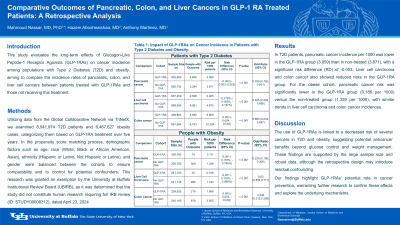Monday Poster Session
Category: Colorectal Cancer Prevention
P2104 - Comparative Outcomes of Pancreatic, Colon, and Liver Cancers in GLP-1 RA Treated Patients: A Retrospective Analysis
Monday, October 28, 2024
10:30 AM - 4:00 PM ET
Location: Exhibit Hall E

Has Audio

Mahmoud Nassar, MD, PhD, MSc, MPA
Jacobs School of Medicine and Biomedical Sciences, University at Buffalo
Buffalo, NY
Presenting Author(s)
Award: ACG Outstanding Research Award in the Colorectal Cancer Prevention Category (Trainee)
Award: Presidential Poster Award
Mahmoud Nassar, MD, PhD, MSc, MPA1, Hazem Abosheaishaa, MD2, Anthony Martinez, MD3
1Jacobs School of Medicine and Biomedical Sciences, University at Buffalo, Buffalo, NY; 2Icahn School of Medicine at Mount Sinai, Queens, NY; 3University at Buffalo, Buffalo, NY
Introduction: This study evaluates the long-term effects of Glucagon-Like Peptide-1 Receptor Agonists (GLP-1RAs) on cancer incidence among populations with Type 2 Diabetes (T2D) and obesity, aiming to compare the incidence rates of pancreatic, colon, and liver cell cancers between patients treated with GLP-1RAs and those not receiving this treatment.
Methods: Utilizing data from the Global Collaborative Network via TriNetX, we examined 8,541,974 T2D patients and 6,467,627 obesity cases, categorizing them based on GLP-1RA treatment over five years. In the propensity score matching process, demographic factors such as age, race (White, Black or African American, Asian), ethnicity (Hispanic or Latino, Not Hispanic or Latino), and gender were balanced between the cohorts to ensure comparability and to control for potential confounders. This research was granted an exemption by the University at Buffalo Institutional Review Board (UBIRB), as it was determined that the study did not constitute human research requiring full IRB review (ID: STUDY00008312), dated April 23, 2024
Results: In T2D patients, pancreatic cancer incidence per 1000 was lower in the GLP-1RA group (3.059) than in non-treated (3.871), with a significant risk difference (RD) of -0.003. Liver cell carcinoma and colon cancer also showed reduced risks in the GLP-1RA group. For the obese cohort, pancreatic cancer risk was significantly lower in the GLP-1RA group (0.186 per 1000) versus the non-treated group (1.339 per 1000), with similar trends in liver cell carcinoma and colon cancer incidences.
Discussion: he use of GLP-1RAs is linked to a decreased risk of several cancers in T2D and obesity, suggesting potential anticancer benefits beyond glucose control and weight management. These findings are supported by the large sample size and robust data, although the retrospective design may introduce residual confounding. Our findings highlight GLP-1RAs' potential role in cancer prevention, warranting further research to confirm these effects and explore the underlying mechanisms.
Note: The table for this abstract can be viewed in the ePoster Gallery section of the ACG 2024 ePoster Site or in The American Journal of Gastroenterology's abstract supplement issue, both of which will be available starting October 27, 2024.
Disclosures:
Mahmoud Nassar, MD, PhD, MSc, MPA1, Hazem Abosheaishaa, MD2, Anthony Martinez, MD3. P2104 - Comparative Outcomes of Pancreatic, Colon, and Liver Cancers in GLP-1 RA Treated Patients: A Retrospective Analysis, ACG 2024 Annual Scientific Meeting Abstracts. Philadelphia, PA: American College of Gastroenterology.
Award: Presidential Poster Award
Mahmoud Nassar, MD, PhD, MSc, MPA1, Hazem Abosheaishaa, MD2, Anthony Martinez, MD3
1Jacobs School of Medicine and Biomedical Sciences, University at Buffalo, Buffalo, NY; 2Icahn School of Medicine at Mount Sinai, Queens, NY; 3University at Buffalo, Buffalo, NY
Introduction: This study evaluates the long-term effects of Glucagon-Like Peptide-1 Receptor Agonists (GLP-1RAs) on cancer incidence among populations with Type 2 Diabetes (T2D) and obesity, aiming to compare the incidence rates of pancreatic, colon, and liver cell cancers between patients treated with GLP-1RAs and those not receiving this treatment.
Methods: Utilizing data from the Global Collaborative Network via TriNetX, we examined 8,541,974 T2D patients and 6,467,627 obesity cases, categorizing them based on GLP-1RA treatment over five years. In the propensity score matching process, demographic factors such as age, race (White, Black or African American, Asian), ethnicity (Hispanic or Latino, Not Hispanic or Latino), and gender were balanced between the cohorts to ensure comparability and to control for potential confounders. This research was granted an exemption by the University at Buffalo Institutional Review Board (UBIRB), as it was determined that the study did not constitute human research requiring full IRB review (ID: STUDY00008312), dated April 23, 2024
Results: In T2D patients, pancreatic cancer incidence per 1000 was lower in the GLP-1RA group (3.059) than in non-treated (3.871), with a significant risk difference (RD) of -0.003. Liver cell carcinoma and colon cancer also showed reduced risks in the GLP-1RA group. For the obese cohort, pancreatic cancer risk was significantly lower in the GLP-1RA group (0.186 per 1000) versus the non-treated group (1.339 per 1000), with similar trends in liver cell carcinoma and colon cancer incidences.
Discussion: he use of GLP-1RAs is linked to a decreased risk of several cancers in T2D and obesity, suggesting potential anticancer benefits beyond glucose control and weight management. These findings are supported by the large sample size and robust data, although the retrospective design may introduce residual confounding. Our findings highlight GLP-1RAs' potential role in cancer prevention, warranting further research to confirm these effects and explore the underlying mechanisms.
Note: The table for this abstract can be viewed in the ePoster Gallery section of the ACG 2024 ePoster Site or in The American Journal of Gastroenterology's abstract supplement issue, both of which will be available starting October 27, 2024.
Disclosures:
Mahmoud Nassar indicated no relevant financial relationships.
Hazem Abosheaishaa indicated no relevant financial relationships.
Anthony Martinez: Abbvie – Consultant, Speakers Bureau. Arbutus – Consultant. Braeburn – Speakers Bureau. Gilead – Consultant, Speakers Bureau. Madrigal – Speakers Bureau. Roche – Consultant. Sirtex – Consultant. VBI – Consultant.
Mahmoud Nassar, MD, PhD, MSc, MPA1, Hazem Abosheaishaa, MD2, Anthony Martinez, MD3. P2104 - Comparative Outcomes of Pancreatic, Colon, and Liver Cancers in GLP-1 RA Treated Patients: A Retrospective Analysis, ACG 2024 Annual Scientific Meeting Abstracts. Philadelphia, PA: American College of Gastroenterology.

